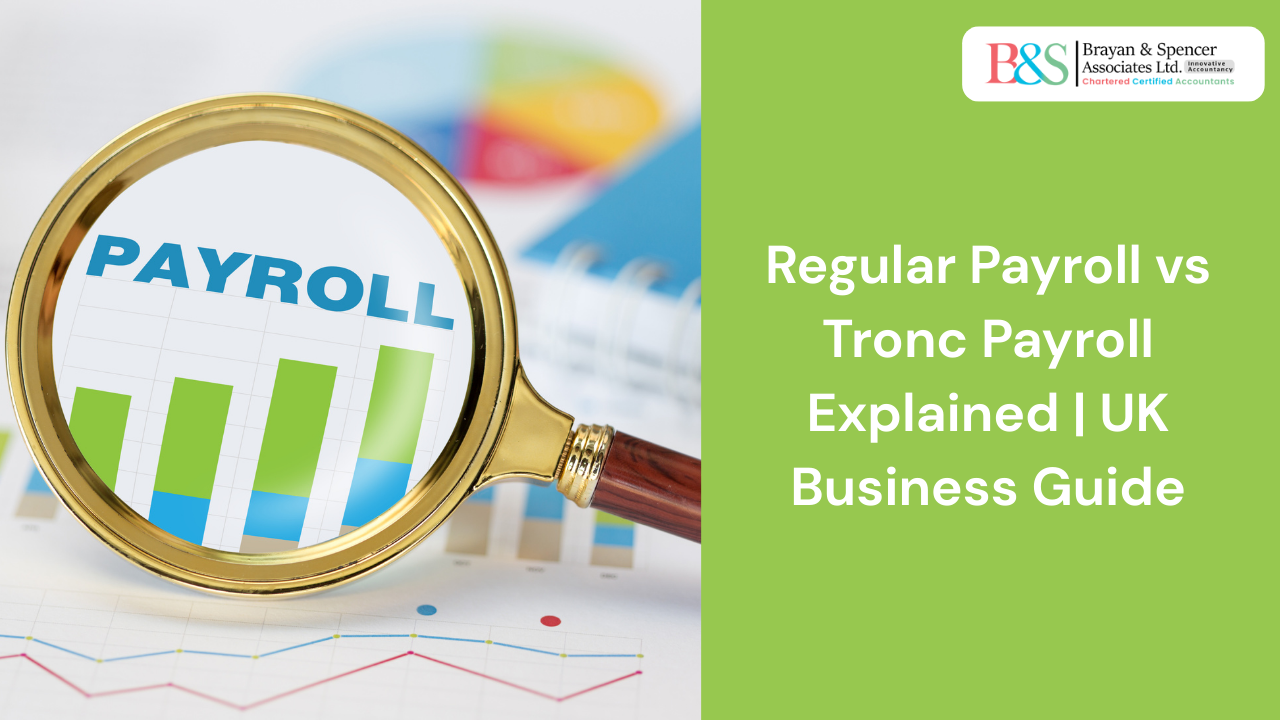What is Payroll and How Does It Work in the UK?
Payroll is the process that ensures your employees are paid accurately and on time. But it’s much more than just issuing wages. In the UK, payroll involves calculating salaries, deducting PAYE income tax, managing National Insurance Contributions (NICs), and reporting everything to HMRC.
Here’s how payroll generally works:
- Calculating Pay: This includes salaries, overtime, bonuses, and tips if processed through payroll.
- Deducting Taxes and NICs: Employers deduct income tax and employee NICs and pay employer NICs.
- Submitting Information to HMRC: Using Real Time Information (RTI), payroll data is submitted each pay period.
- Payslips: Employees receive payslips showing gross pay, deductions, and net pay.
- Year-End Reporting: Employers prepare P60s and calculate total PAYE liabilities for HMRC.
A well-managed payroll ensures legal compliance, accurate payments, and happy employees. But depending on your business, you might have two main options: Regular Payroll or Tronc Payroll.
Regular Payroll – The Standard Approach
Regular Payroll, also called standard PAYE, is the most common system in the UK. It handles:
- Salaries and wages
- Overtime and statutory pay
- Tips processed through payroll
Key Features:
- PAYE income tax is automatically deducted.
- Employee and employer NICs apply to all pay elements, including tips processed through payroll.
- Wages are outside the scope of VAT. Voluntary tips are also outside VAT, but mandatory service charges are VATable at 20%.
Benefits:
- Simple and straightforward, using a single payroll system.
- Ensures full compliance with HMRC rules.
Drawbacks:
- Employer costs are higher due to NICs.
- Employees take home less because NICs are applied to all taxable pay elements, including tips.
Regular payroll is ideal for businesses where tips are minimal, or for sectors outside hospitality where all staff are paid fixed wages.
Tronc Payroll – Designed for Tips and Service Charges
A tronc system is an independent method for distributing tips, gratuities, and service charges, most commonly used in the hospitality industry. A troncmaster manages the tronc, which means the employer has no control over the distribution.
Key Features:
- PAYE income tax applies to tronc payments.
- NICs are not deducted if the employer does not control distribution.
- Voluntary tips remain outside VAT; mandatory service charges are VATable.
- Tronc affects PAYE/NICs compliance, not VAT.
Benefits:
- Employees take home more money, boosting morale.
- Employer costs are lower since NICs are not applied.
- Transparent distribution improves staff loyalty and reduces disputes over tips.
Drawbacks:
- Requires a separate payroll system.
- Must appoint a troncmaster to ensure correct and compliant distribution.
Regular Payroll vs Tronc Payroll – Side-by-Side
| Aspect | Regular Payroll | Tronc Payroll |
| Coverage | Salaries, wages, overtime, statutory pay, tips if processed | Tips, gratuities, service charges only |
| PAYE | Deducted on all pay elements | Deducted on tronc payments |
| NICs | Employee + Employer NICs | No NICs if independent |
| VAT | Wages outside VAT; voluntary tips outside VAT; mandatory service charges VATable | Same VAT treatment |
| Employer Costs | Higher due to NICs and VAT on mandatory charges | Lower (no NICs, only VAT on mandatory service charges) |
| Employee Take-Home | Lower | Higher |
| Administration | Simple, one payroll | More complex, separate tronc payroll required |
How to Choose the Right Payroll System
- Hospitality businesses: Tronc payroll can reduce costs and increase employee satisfaction because staff take home more of their tips.
- Other UK businesses: Regular payroll is simpler and cost-effective for businesses where tips are minimal or non-existent.
Practical Tips for Employers:
- Keep clear, up-to-date payroll and tronc records for HMRC compliance.
- Understand VAT rules – voluntary tips are outside VAT; mandatory service charges are VATable.
- Use a transparent tronc system to improve staff morale.
- Outsource payroll to professional providers to reduce errors and save time.
- Plan employer costs wisely – NIC savings with tronc can help budget effectively.
Why BS Associates is the Trusted Payroll Partner in London
At BS Associates, we provide fully managed payroll services for UK businesses of all sizes:
- Standard PAYE payroll for employees
- Tronc payroll setup and management for hospitality businesses
- RTI submissions to HMRC
- End-of-year payroll documentation including P60s and total PAYE calculations
We work closely with businesses to create customized payroll solutions that save time, reduce errors, and ensure compliance. Whether you’re a small café or a large hospitality chain, we make payroll simple, accurate, and stress-free.
📞 Contact BS Associates at 01233 801 809 or email info@bsassociate.co.uk to streamline your payroll today.
Conclusion
Payroll is not just about paying employees – it’s about keeping your business compliant, managing costs, and keeping staff happy. Choosing between Regular Payroll and Tronc Payroll depends on your industry, employee structure, and the type of payments involved.
With the right system and professional support, UK businesses can:
- Stay fully compliant with HMRC rules
- Reduce operational costs
- Improve employee satisfaction through fair pay and transparent tip distribution
Investing in a trusted payroll provider ensures your payroll is efficient, accurate, and employee-friendly.




